As a loving pet parent, ensuring your dog’s health and safety is always a top priority. While it’s tempting to share your favorite snacks, many human foods can be incredibly harmful, and even toxic, to dogs. Knowing what dogs shouldn’t eat list is crucial for preventing accidental poisonings, which sadly affect hundreds of thousands of pets annually in the United States alone. Even small amounts of certain foods can lead to severe illness or worse.
This guide, reviewed by Dr. Fiona Lee, aims to serve as your go-to “cheat sheet” to help you distinguish between safe and dangerous foods, keeping your furry companion protected and healthy. We’ll explore why certain foods are toxic, provide a detailed list of common foods to avoid, and even touch upon some safe alternatives. For more specific information, consider exploring our complete what foods can dogs not eat list.
Why Certain Foods Are Toxic to Dogs
A common question among pet owners is, “What can dogs eat and not eat?” The answer lies in the fundamental differences between human and canine digestion and metabolism. Dogs’ bodies process various substances very differently than ours, making many foods we consider safe or even healthy highly toxic to them.
For instance, theobromine and caffeine, found in chocolate, are metabolized much slower by dogs. This allows these substances to accumulate rapidly in their system, potentially becoming fatal. Similarly, while you might enjoy cherries, the cyanide in their pits, stems, and leaves can pose a significant risk if ingested in large quantities. Beyond toxicity, fruit pits can also cause gastrointestinal upset and obstruction due to their indigestible nature.
Food toxicity can also vary based on a dog’s size, breed, and existing health conditions. Therefore, always consult your veterinarian if you have any questions or concerns about specific foods your dog might encounter.
List of Common Foods Dogs Cannot Eat
Many household foods are dangerous, and often toxic, to dogs. Some of the most common foods that are bad for dogs include alcohol, avocados, macadamia nuts, grapes and raisins, xylitol, and chocolate. It is crucial for your dog to avoid all the foods listed below. Remember, this is not an all-inclusive list, but it covers the most common dangers.
1. Alcohol
Because cats and dogs are significantly smaller than humans, alcohol can have a much deadlier effect on them. Even minimal amounts can cause harm, with the danger increasing for smaller pets. Symptoms of alcohol poisoning in dogs mirror those in humans, including vomiting, breathing difficulties, coma, and even death.
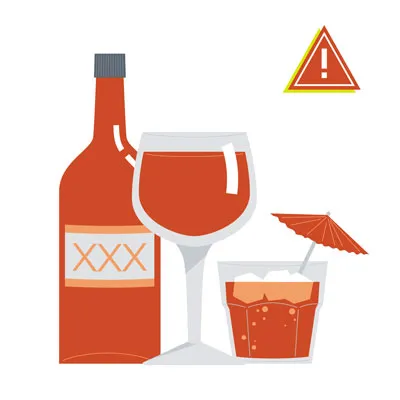 A glass of beer and a bottle of wine, representing alcoholic beverages
A glass of beer and a bottle of wine, representing alcoholic beverages
2. Apple, Apricot, Cherry, and Plum Seeds/Pits
While the fleshy part of an apple is generally safe for dogs, the core and seeds are not. Apple seeds contain cyanide, and though small amounts may not be immediately harmful, it’s safest to avoid them entirely. Similarly, apricot, cherry, peach, and plum seeds and pits also contain cyanide, which can lead to severe symptoms like vomiting, irregular heartbeats, seizures, coma, and even death. This is due to cyanide’s interference with red blood cells’ ability to carry oxygen.
3. Avocado
Avocados are not a good choice for dogs. There have been documented cases of myocardial damage in dogs after consuming avocados, though these results haven’t been widely replicated. More commonly, the large, intact pit of an avocado can cause a dangerous gastrointestinal obstruction if ingested by a dog. It’s best to steer clear of this fruit.
4. Broccoli
Broccoli contains isothiocyanates, which can be harmful to pets in very large doses. While small amounts might be okay occasionally, given the abundance of healthy alternatives, it’s often best to avoid it. Broccoli stalks can also pose a choking hazard or cause an obstruction in a dog’s throat.
5. Caffeine and Coffee Grounds
Caffeine contains methylxanthines, which can cause potentially fatal symptoms such as diarrhea, vomiting, seizures, and an irregular heartbeat in dogs. Ingesting coffee grounds or high-caffeine drinks can cause a dog’s heart to race, leading to tremors, arrhythmia, difficulty breathing, and other serious issues.
6. Chicken and Turkey Skin, Ham, and Other Fatty Cuts of Meat
Fatty cuts of meat, ham, and poultry skin are bad for dogs due to their high fat content. These can trigger acute pancreatitis, a severe and life-threatening illness with serious complications. It’s much safer to discard these items rather than offering them as treats.
It’s also crucial to avoid turkey and chicken bones, as they can splinter and cause internal damage or obstructions in the stomach or intestines, potentially leading to fatal abdominal infections.
7. Chocolate
Chocolate toxicity is a frequent cause of pet poisoning, especially during holidays. Dogs should never eat any chocolate product. Chocolate contains theobromine, a lethal component, with darker chocolates having higher concentrations. It also contains caffeine, and some sugar-free chocolates may even include xylitol, which is highly toxic to dogs. Dogs and cats cannot metabolize chocolate as efficiently as humans. Dark chocolate and baker’s chocolate are the most dangerous, but any type of chocolate can be problematic.
Symptoms of chocolate ingestion include hyperactivity, vomiting, diarrhea, pancreatitis, abnormal heart rhythm, and seizures. If your dog consumes any amount of chocolate, no matter how small, contact your veterinarian immediately. It’s a critical item on any list of what dogs cant eat.
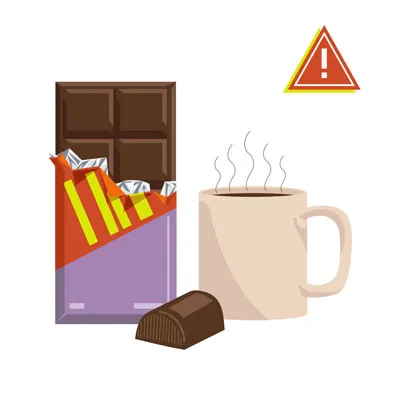 Different types of chocolate bars and pieces, from dark to milk chocolate
Different types of chocolate bars and pieces, from dark to milk chocolate
8. Grapes and Raisins
Grapes and raisins are exceptionally dangerous to dogs. These fruits can lead to severe problems like kidney failure because their tartaric acid is toxic to a dog’s kidneys. Even a few bites can wreak havoc. Symptoms of raisin or grape poisoning include vomiting, diarrhea, loss of appetite, changes in urination, or a complete absence of urine production.
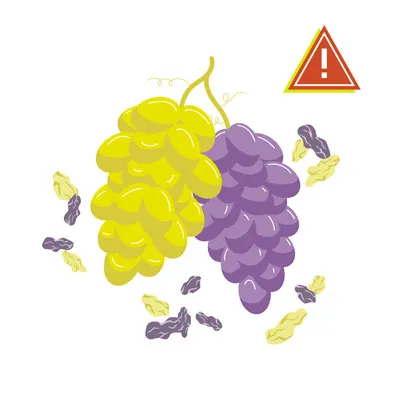 Bunches of red and green grapes, fresh and ripe
Bunches of red and green grapes, fresh and ripe
9. Macadamia Nuts, Almonds, and Pistachios
Macadamia nuts can cause numerous painful symptoms in dogs, including weakness, overheating, and vomiting. While the exact mechanism of toxicity isn’t fully understood, these nuts are considered highly toxic to dogs; as few as six nuts can cause severe poisoning in a small dog.
Other nuts, like pistachios and almonds, may pose choking hazards, especially if flavored or spiced. It’s generally safest to avoid feeding any nuts to your dog.
10. Milk and Dairy Products
Milk and other dairy products should be evaluated on a case-by-case basis. Some dogs can tolerate them, but many are lactose intolerant or allergic, experiencing diarrhea and gas if they consume cow’s milk. Ice cream is also unhealthy due to its high sugar and fat content. Instead, offer frozen bites of healthy fruits that dogs can safely eat. Small quantities of lower-fat cheese can be an acceptable treat, but avoid high-fat varieties.
11. Mushrooms
It’s always best to exercise caution and avoid feeding your dog mushrooms. Many varieties contain toxins that can cause kidney and liver failure, vomiting, diarrhea, hallucinations, and red blood cell damage. While washed, white grocery store mushrooms might be okay, choosing a different, safer treat is generally preferable.
12. Nutmeg and Cinnamon
Dogs should never be fed foods containing nutmeg. This spice can induce hallucinations and severe vomiting. The culprit is myristicin, a compound in nutmeg, which has stronger effects in high doses or on smaller dogs. Always contact your veterinarian if your dog ingests any amount of nutmeg.
Cinnamon, while not toxic, should also be avoided because it can irritate a dog’s mouth and potentially lead to low blood sugar, which can have serious health consequences.
13. Onions, Garlic, Chives, and Leeks
Many pet owners are surprised to learn that herbs from the allium family—such as onions, garlic, chives, and leeks—are unsafe for dogs. These plants contain sulfoxides and disulfides, which can damage red blood cells and cause anemia in both dogs and cats. Onion and garlic powders are found in many prepared foods, so always read labels before sharing human food with your pet. All allium plants can cause potentially fatal anemia in dogs, with certain Japanese breeds like Akitas and Shiba Inus being particularly sensitive.
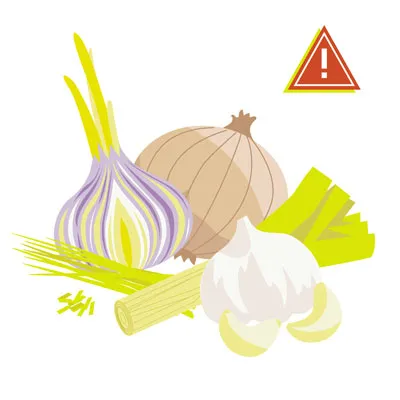 A collection of onions, garlic cloves, chives, and leeks
A collection of onions, garlic cloves, chives, and leeks
14. Salt
Excessive salt intake can disrupt the fluid balance in a dog’s cells. Too much salt can lead to tremors, seizures, diarrhea, or even a coma. Whether your dog is interested in rock salt, homemade play dough, or potato chips, do not compromise their health for a treat.
15. Spicy Food
Keep your dog away from spicy foods. Hot, spicy ingredients can cause vomiting, stomach ulcers, or diarrhea, which can be painful for your dog and lead to costly emergency veterinary visits.
16. Sugar-Free Gum and Candy (Xylitol)
Xylitol is an artificial sweetener found in many human foods, including sugar-free gum, candy, and baked goods. In dogs, it causes a rapid and dangerous drop in blood sugar, leading to weakness and seizures. Some dogs may even develop liver failure. Poisoning cases involving xylitol are increasing, with the amount in just five pieces of gum potentially fatal to a 65-pound dog. This is another crucial item on your what are foods that dogs can t eat checklist.
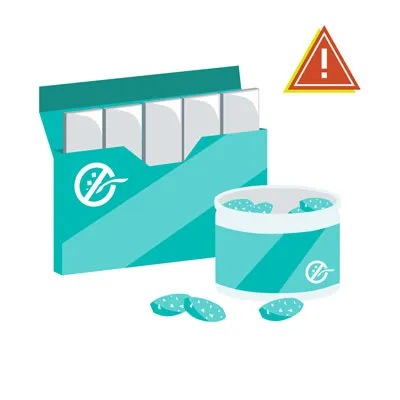 Sugar-free gum and candies, indicating artificial sweeteners like xylitol
Sugar-free gum and candies, indicating artificial sweeteners like xylitol
17. Tomatoes and Raw Potatoes
Tomatoes and potatoes fall into a category of foods that are safe in some forms but unsafe in others. A ripened red tomato is generally fine for dogs. However, the green parts of the tomato plant and unripe green tomatoes contain solanine, which is toxic to dogs.
Potatoes follow a similar rule: baked or boiled potatoes without additives are generally safe in small amounts. However, raw potatoes also contain solanine and are toxic to dogs.
18. Tobacco
Tobacco is extremely dangerous and unhealthy for dogs. Exposure to nicotine-containing products can cause a range of symptoms, including vomiting, diarrhea, rapid breathing, agitation, abnormal heart rate, wobbliness, muscle weakness, high or low blood pressure, seizures, and tremors. More significant or frequent exposure can lead to blue gums, coma, and ultimately be fatal. Dogs are curious and may ingest cigarette butts or other tobacco products found on walks or around the house. If your dog gets into tobacco, seek immediate veterinary attention.
19. Yeast and Raw Dough
Yeast and raw dough are unsafe for dogs for several reasons. Raw dough can expand in a dog’s stomach, causing severe pain, and potentially life-threatening gastric torsion or rupture. Additionally, the yeast and sugar in raw dough can ferment, producing alcohol and leading to alcohol toxicity. This can quickly become fatal, requiring immediate medical intervention.
20. Raw Meat
Never feed your dog raw or undercooked meat. Raw meat can carry harmful bacteria like Salmonella or E. coli, which can sicken dogs just as they can sicken humans. Furthermore, bones in raw meat can pose a choking hazard or cause internal injuries. For guidance on appropriate feeding, especially if your dog is not eating, you might want to look at what to feed dog that will not eat.
21. Rhubarb
Rhubarb, often used in desserts, is not safe for pets. Its leaves contain soluble calcium oxalate crystals. If ingested in large enough quantities, these crystals can bind with calcium in the body, causing a dangerous drop in calcium levels and potentially leading to renal failure. Symptoms include tremors, weakness, drooling, bloody urine, changes in thirst and urination, and vomiting.
22. Star Fruit
Similar to rhubarb, star fruit also contains soluble calcium oxalate crystals. It’s best to prevent your dog from snacking on this fruit.
23. Flavored Water and Seltzer Water
It’s always safest to give your dog fresh, clean water rather than anything flavored or carbonated. Seltzer and flavored waters can contain added ingredients harmful to pups, such as sugar or salt. While plain seltzer water might be acceptable in small, urgent amounts, it can still lead to gas and bloating. Stick to plain water to be safe.
What Dogs Are Most at Risk if They Consume Toxic Foods?
While all dogs should avoid toxic foods, some are at a higher risk of severe reactions:
- Small breeds vs. large breeds: Smaller dogs are more vulnerable due to their lower body weight, especially with substances like chocolate.
- Puppies: Younger dogs have less developed digestive and immune systems, increasing their risk from certain substances.
- Elderly dogs: Older dogs may be at higher risk due to pre-existing health conditions.
- Dogs with pre-existing conditions: Conditions like diabetes or kidney disease can put a dog at greater risk.
How To Prevent Dogs from Eating Toxic Foods
While accidents can happen, proactive steps can significantly minimize the risk of your beloved pup ingesting unsafe human food. This is key to maintaining a healthy diet and ensuring your pet’s well-being.
1. Store Foods Out of Reach
Ensure that your dog cannot access any toxic food items. Keep dangerous foods on high shelves or securely locked away in cabinets that your pup cannot open.
2. Avoid Feeding Dogs from Your Plate
Resist the urge to feed your dog from your plate or while you are cooking in the kitchen, even if it’s just a tiny treat. It is safest to only provide treats specifically formulated for dogs. This practice reinforces the boundary and prevents accidental exposure to harmful ingredients.
3. Educate Family Members and Guests
It’s essential to educate all family members, including children, and any guests about the dangers of human food for dogs. Make sure everyone understands that, no matter how tempting it may be, they should never sneak food to your dog. Consistency is vital in preventing accidental ingestion.
4. Be Careful During Holidays
Exercise extra caution during holidays and special occasions. The hustle and bustle of these times can make it easy to lower your guard while cooking or entertaining. Keep all food items secured and out of reach.
If, despite your precautions, your dog eats something toxic, being prepared can help you act quickly. Keep emergency contact information readily available for 24/7 veterinary services, including poison control hotlines. Understanding what food dogs can t eat is a critical first step in prevention.
What To Do if Your Dog Eats Something Toxic
If you suspect your dog has eaten something toxic, immediate action is crucial.
Familiarize yourself with the common symptoms of food toxicity so you can quickly recognize if your dog has ingested something harmful. Symptoms can vary depending on the substance, but may include listlessness, distress, pain, vomiting, bloody stools, or a bloated and hard-to-the-touch stomach. This painful bloating can indicate a dangerous condition that may lead to stomach rupture if not treated promptly.
If you notice any of these symptoms, do the following:
- Call your veterinarian or poison control right away. Timing is vital for successful treatment and shorter hospitalization periods.
- Be prepared with information such as the type of food eaten, the estimated amount consumed, and the time of ingestion.
- Avoid home remedies unless explicitly advised by your veterinarian. Inducing vomiting, for example, can be harmful in certain situations.
Dog Care Story Can Help You Keep Your Dog Healthy
Navigating the complexities of pet safety, from household toxins to dangerous foods, can be challenging. Dogs are naturally curious creatures, and sometimes their discerning taste isn’t quite as developed as we’d like! However, by following this comprehensive guide and remaining vigilant, you can significantly help protect your dog from foods that can cause harm.
The good news is that there’s an extensive list of safe and healthy foods that dogs can enjoy! Discover which ones your dog loves and offer them as rewarding treats. If you ever have doubts about a particular food, always consult your veterinarian for expert advice.
Pet insurance is an excellent way to help protect your dog from unexpected encounters with toxins or illnesses. At Dog Care Story, we believe in providing resources that support your pet’s well-being. Our articles and guides are designed to empower you with the knowledge needed to ensure a long, healthy, and happy life for your beloved companion.
References
- “Top 10 dog poisons,” Hilary Parker (5/2023), WebMD, https://www.webmd.com/pets/dogs/top-10-dog-poisons
- “What happens if a dog eats chocolate?” (10/2023), Colorado State University, https://vetmedbiosci.colostate.edu/vth/animal-health/why-is-chocolate-bad-for-dogs/
- “Fruits and vegetables dogs can or can’t eat,” (3/2024), American Kennel Club, https://www.akc.org/expert-advice/nutrition/fruits-vegetables-dogs-can-and-cant-eat/
- “What to do if your dog drinks alcohol,” Jerry Klein (7/2023), American Kennel Club, https://www.akc.org/expert-advice/vets-corner/is-alcohol-dangerous-for-dogs/
- “Can dogs eat apples?” Hector Joy (12/2022), PetMD, https://www.petmd.com/dog/general-health/can-dogs-eat-apples
- “Can dogs eat plums?” Katie Koschalk (7/2023), Chewy, https://be.chewy.com/nutrition-pet-diet-tips-can-dogs-eat-plums/
- “Avocado (Persea spp) Toxicosis in Animals,” Cristine Hayes (9/2024), Merck Veterinary Manual, https://www.merckvetmanual.com/toxicology/food-hazards/avocado-persea-spp-toxicosis-in-animals
- “People foods to avoid feeding your pets,” (n.d.), ASPCA, https://www.aspca.org/pet-care/animal-poison-control/people-foods-avoid-feeding-your-pets
- “People foods dogs can and can’t eat,” (3/2024), American Kennel Club, https://www.akc.org/expert-advice/nutrition/human-foods-dogs-can-and-cant-eat/
- “Can dogs eat nuts?” Amanda Ardente (1/2023), PetMD, https://www.petmd.com/dog/nutrition/can-dogs-eat-nuts
- “Can dogs drink milk?” Sandra C. Mitchell (1/2024), PetMD, https://www.petmd.com/dog/nutrition/can-dogs-drink-milk
- “Can dogs have nutmeg?” Barri J. Morrison (11/2023), PetMD, https://www.petmd.com/nutmeg-safe-dogs
- “Onion, garlic, chive, and leek poisoning in dogs,” Renee Schmid et al. (2024), VCA Animal Hospitals, https://vcahospitals.com/know-your-pet/onion-garlic-chive-and-leek-toxicity-in-dogs
- “Can dogs eat tomatoes?” Anna Burke (10/2024), American Kennel Club, https://www.akc.org/expert-advice/nutrition/can-dogs-eat-tomatoes/
- “Can dogs eat potatoes?” Katherine Ripley (11/2023), American Kennel Club, https://www.akc.org/expert-advice/nutrition/can-dogs-eat-potatoes/
- “What to do if your dog eats a cigarette butt,” (6/2023), American Kennel Club, https://www.akc.org/expert-advice/health/dog-ate-cigarette-butt/
- “Dough & dogs: Why it’s bad and what you can do,” Lisa Goldstein (7/2024), Preventive Vet, https://www.preventivevet.com/dogs/dough-is-toxic-to-dogs
- “Rhubarb,” (n.d.), Pet Poison Helpline, https://www.petpoisonhelpline.com/poison/rhubarb/
- “Can dogs drink carbonated water?” Heather Logue (n.d.), Rover, https://www.rover.com/blog/can-dogs-drink-carbonated-water/
- “What fruits can dogs eat?” Ellen Malmanger (2/2024), PetMD, https://www.petmd.com/dog/nutrition/what-fruits-can-dogs-eat
- “Can dogs have green beans?” Anna Burke (8/2022), American Kennel Club, https://www.akc.org/expert-advice/nutrition/can-dogs-have-green-beans/
- “About pet food safety,” (4/2024), CDC, https://www.cdc.gov/healthy-pets/about/pet-food-safety.html
